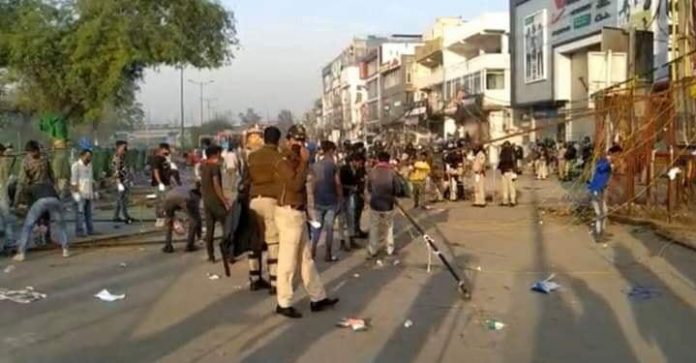Shaheen Bagh: Longest-Running anti-CAA sit-in removed forcefully
 NEW DELHI : The Delhi Police has broken up the longest-running protest against a new citizenship law, citing a ban on public gatherings because of the coronavirus pandemic.
NEW DELHI : The Delhi Police has broken up the longest-running protest against a new citizenship law, citing a ban on public gatherings because of the coronavirus pandemic.
Cops reached the site of the protest – which had inspired similar demonstrations across the country – at around 7 am. “They were not clearing the protest site despite repeated persuasion.
When they refused to clear up, they were removed forcefully at around 7:30 am,” said an official, adding that large gatherings have been banned under Section 144 over COVID-19. Nine people, including six women and three men, have been detained.
“They were not clearing the protest site despite repeated persuasion. When they refused to clear up, they were removed forcefully at around 7:30 am,” a police official told.
Dozens of people, many of them women, have been staging a sit-in protest since early December on a street in the Shaheen Bagh neighbourhood, which has become a focal point for opposition to the law seen as discriminating against Muslims.
Hundreds of police in riot gear surrounded the protesters early on Tuesday and told them to leave, said Delhi’s joint police commissioner, DC Srivastava. “It is a dangerous environment, with this coronavirus, we urged them to leave,” he told reporters.
Last week, Shaheen Bagh protesters had said they would limit the size of their protest to 50 to comply with the Delhi government’s orders. On Sunday, during the ‘janata curfew’ called by Prime Minister Narendra Modi, only five women remained at the protest site, symbolically, sitting at a distance from each other.
Some demonstrators resisted the police, and at least nine people had been detained, six of them women, Srivastava said, adding there was no violence. Television showed police bulldozers taking down tents and billboards at the protest site.
Delhi is under a lockdown until the end of the month to halt the spread of the coronavirus, and public gatherings of more than five people have been banned. The Citizenship Amendment Act, which eases the path for non-Muslims from three neighbouring countries to gain citizenship, triggered weeks of sometimes violent protests against Modi’s government after it was passed in December.
At least 78 people have been killed in demonstrations triggered by the law across the country, a large number of them in northeast Delhi during violence last month.
Critics say the law discriminates against Muslims and it has deepened concern that Prime Minister Narendra Modi’s administration is undermining India’s secular traditions.
Modi’s ruling Hindu nationalist Bharatiya Janata Party (BJP) denies any bias against India’s 180 million Muslims.
Even before the coronavirus pandemic, the protest at Shaheen Bagh had become a thorn in the government’s side, and there had been calls by hardline Hindu groups linked to Modi’s alliance and residents in the area to clear it out.
India has reported 471 cases of the coronavirus, but health experts have warned that a big jump is imminent, which would likely overwhelm the underfunded and crumbling public health infrastructure.
Protesters had told that while they understood the dangers of coronavirus and were taking adequate precautions including sanitising regularly, they felt the threat of the Citizenship (Amendment) Act was much larger than the dangers of COVID-19.
“We understand that coronavirus outbreak is deadly, but for us, CAA, NPR and NRC are equally deadly,” one woman had said.
“This is just a momentary break. We understand the situation right now and don’t want to cause any kind of inconvenience. Once the situation gets better, we will organize and agitate once again,” said protestors.
The Shaheen Bagh protest had made international headlines over the last few months. The women – also called the Dadis (grandmothers) of Shaheen Bagh – were protesting against the Citizenship Amendment Act, National Register of Citizen (NRC) and National Population Register (NPR), which they call “anti-Muslim”.
(With Agency Inputs ).

